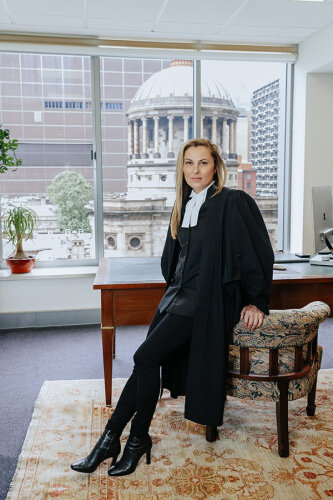Best Sex Crime Lawyers in Melbourne
Share your needs with us, get contacted by law firms.
Free. Takes 2 min.
List of the best lawyers in Melbourne, Australia
About Sex Crime Law in Melbourne, Australia
Sex crime law in Melbourne, Australia, involves a range of offenses that are governed by both state and federal legislation. Victoria, the state in which Melbourne is located, enforces strict laws to protect individuals from sexual violence, misconduct, and exploitation. The relevant legislation includes the Crimes Act 1958 and the Criminal Procedure Act 2009, which outline various offenses such as sexual assault, rape, child pornography, and indecent exposure. These laws are designed to ensure justice for victims while safeguarding the rights of the accused during legal proceedings.
Why You May Need a Lawyer
Engaging a lawyer is crucial if you find yourself involved in a sex crime case, whether as a victim, accused, or witness. A lawyer can help navigate the complex judicial process, ensuring that your rights are protected. Common situations necessitating legal aid include being accused of a sex crime, seeking justice as a survivor, or being involved in familial or workplace settings where accusations arise. Furthermore, a lawyer can offer valuable advice on gathering evidence, understanding court procedures, and negotiating plea deals or settlements.
Local Laws Overview
In Melbourne, several key aspects of local legislation are particularly relevant to sex crime cases. The Crimes Act 1958 specifies the legal definitions of sexual offenses, including rape, which involves sexual penetration without consent, and indecent assault, which covers various types of unwanted touching. The law outlines harsh penalties for offenders, reflecting the seriousness with which these offenses are viewed. The legal framework also covers mandatory reporting laws, especially for professionals like teachers and doctors, who are obligated to report suspected cases of child abuse. Moreover, the legislation emphasizes the importance of consent, recognizing it as a freely given, informed, and voluntary agreement.
Frequently Asked Questions
What should I do if I've been accused of a sex crime?
If you've been accused of a sex crime, it is crucial to seek legal advice immediately. Avoid speaking about the case with anyone other than your lawyer to protect your rights and avoid self-incrimination. Your lawyer will guide you through the legal process.
How is consent defined under Victoria's sex crime laws?
Under Victorian law, consent is defined as a free and voluntary agreement. The absence of consent makes any sexual activity unlawful, and consent cannot be given if an individual is under duress, impaired by alcohol or drugs, or unconscious.
Can accusations of sex crime affect my employment?
Yes, accusations of sex crime can have significant impacts on your employment, especially in roles involving vulnerable individuals. It is important to engage a lawyer to navigate these consequences and understand your rights.
What penalties can be imposed for sex crime convictions in Melbourne?
Penalties can vary widely depending on the specific offense, the circumstances of the case, and the offender’s criminal history. Sentences can include fines, rehabilitation programs, and imprisonment, with serious offenses like rape carrying extensive prison terms.
Are there provisions for protecting the identity of sex crime victims in Melbourne?
Yes, the law provides for the confidentiality and protection of victims' identities. Courts can impose orders to suppress identifying information to protect the privacy and well-being of victims.
How long do investigations into sex crimes typically take?
The duration of investigations can vary based on the complexity of the case, evidence availability, and court schedules. Some cases may take several months or more before reaching resolution.
What support services are available for sex crime victims in Melbourne?
Victims of sex crimes can access a range of support services including counseling, legal advice, and emergency healthcare through organizations such as the Centre Against Sexual Assault (CASA) and state-funded programs.
Is it possible to have a sex crime conviction expunged in Melbourne?
In certain situations, individuals may apply for their convictions to be spent. This typically involves meeting specific criteria and a waiting period, and it is advisable to seek legal advice for specific eligibility.
What role does DNA evidence play in sex crime cases?
DNA evidence can be crucial, often serving as vital proof of involvement in a crime. It can either corroborate a victim's account or exonerate individuals where there is no match to the accused.
How does one report a sex crime in Melbourne?
To report a sex crime, victims or witnesses can contact the local police or utilize emergency services by calling 000. There are also dedicated hotlines for sexual assault services that provide guidance and support.
Additional Resources
For further assistance, consider reaching out to the following resources:
- Victoria Police Sex Crimes Squad: Offers specific handling of sex crime cases.
- Victims of Crime Helpline: Provides support and referrals for victims.
- Centre Against Sexual Assault (CASA): Provides crisis care and counseling services.
- Legal Aid Victoria: Offers legal advice for those who cannot afford a private lawyer.
Next Steps
If you need legal assistance relating to a sex crime in Melbourne, consider taking the following steps:
- Consult a specialized sex crime lawyer who understands local laws and can provide tailored advice.
- Contact Legal Aid Victoria if you require financial assistance for legal representation.
- Preserve any evidence related to the case, and share it with your lawyer.
- Maintain records of any incidents, communications, or interactions that may be relevant to your case.
- Consider accessing available support services for emotional and psychological assistance.
Lawzana helps you find the best lawyers and law firms in Melbourne through a curated and pre-screened list of qualified legal professionals. Our platform offers rankings and detailed profiles of attorneys and law firms, allowing you to compare based on practice areas, including Sex Crime, experience, and client feedback.
Each profile includes a description of the firm's areas of practice, client reviews, team members and partners, year of establishment, spoken languages, office locations, contact information, social media presence, and any published articles or resources. Most firms on our platform speak English and are experienced in both local and international legal matters.
Get a quote from top-rated law firms in Melbourne, Australia — quickly, securely, and without unnecessary hassle.
Disclaimer:
The information provided on this page is for general informational purposes only and does not constitute legal advice. While we strive to ensure the accuracy and relevance of the content, legal information may change over time, and interpretations of the law can vary. You should always consult with a qualified legal professional for advice specific to your situation.
We disclaim all liability for actions taken or not taken based on the content of this page. If you believe any information is incorrect or outdated, please contact us, and we will review and update it where appropriate.
















